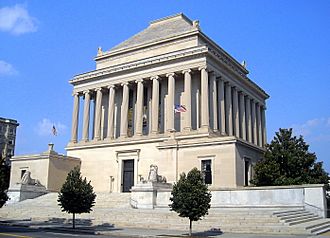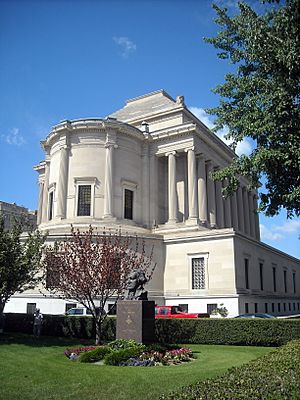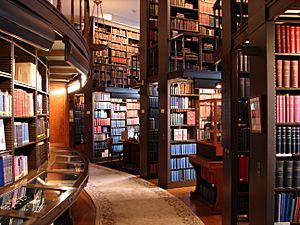House of the Temple facts for kids
Quick facts for kids The House of the Temple |
|
|---|---|

House of the Temple in 2008
|
|
| General information | |
| Architectural style | American Neoclassicism |
| Address | 1733 16th St NW |
| Town or city | Washington, D.C. |
| Country | United States |
| Coordinates | 38°54′50″N 77°02′09″W / 38.9138°N 77.0359°W |
| Construction started | October 18, 1911 |
| Completed | October 18, 1915 |
| Client | Scottish Rite of Freemasonry |
| Design and construction | |
| Architect | John Russell Pope |
The House of the Temple is a grand building in Washington, D.C., United States. It serves as the main office for the Scottish Rite of Freemasonry, Southern Jurisdiction, U.S.A. This group is part of Freemasonry, which is one of the oldest and largest friendly societies in the world.
The building was designed by a famous architect named John Russell Pope. You can find it at 1733 16th Street, N.W., in the Dupont Circle area. It's about a mile north of the White House.
The House of the Temple also has a huge collection of items about the Scottish poet and Freemason Robert Burns. Its library holds one of the world's largest collections related to him. This library was actually the first public library in Washington, D.C.
Contents
Building History and Design
On May 31, 1911, the leader of the Supreme Council, James D. Richardson, started the construction of the House of the Temple. The first stone, called the cornerstone, was placed on October 18, 1911. This was done by J. Claude Keiper, who was the Grand Master of the Grand Lodge of the District of Columbia.
The architect, John Russell Pope, designed the building to look like the Mausoleum of Halicarnassus. This ancient tomb was one of the Seven Wonders of the Ancient World. The House of the Temple was finished and officially opened four years later, on October 18, 1915.
The building's design was highly praised by other architects. John Russell Pope even won a Gold Medal for it in 1917. Experts called it a "monument of remarkable sumptuousness" and an "admirable study of antique architecture." In the 1920s, architects voted it one of the top public buildings in the United States.
Inside the Temple and Its Collections
In 1944, the remains of a former leader, Albert Pike, were moved to the House of the Temple. Another past leader, John Henry Cowles, was also buried there in 1952.
As mentioned, the Temple's library has one of the biggest collections of items related to the Scottish poet and Freemason Robert Burns. This library was very important because it was the first public library in Washington, D.C., when it opened in 1870.
The House of the Temple is recognized as an important part of the Sixteenth Street Historic District. This district was added to the National Register of Historic Places in 1978.
Community Garden Project
From 1990 to 2011, the temple had a community garden on its grounds. This garden was about a quarter of an acre and had around 70 small plots. Local residents used these plots to grow their own plants. In the fall of 2011, the garden was closed. The space was needed for construction equipment for a building repair project.
See also
 In Spanish: Casa del Templo para niños
In Spanish: Casa del Templo para niños
- List of Masonic buildings in the United States
- List of Masonic libraries
Images for kids
 | Janet Taylor Pickett |
 | Synthia Saint James |
 | Howardena Pindell |
 | Faith Ringgold |





